Top 8 Omnichannel Contact Centre Solutions for Enterprises

Enterprises in 2025 face rising expectations for seamless omnichannel customer service software. Strong omnichannel contact centre solutions drive measurable gains in customer experience, revenue, and loyalty. A recent study shows that 71% of companies using digital omnichannel integration platforms report significant business value, while businesses with strong omnichannel strategies see 10% higher revenue growth and 25% higher close rates (Deloitte Digital, Adobe). Seamless integration across channels ensures personalized, consistent customer interactions, leading to improved retention and operational efficiency. Sobot AI, with its unified omnichannel customer service software and Sobot call center, empowers enterprises to elevate every customer experience.
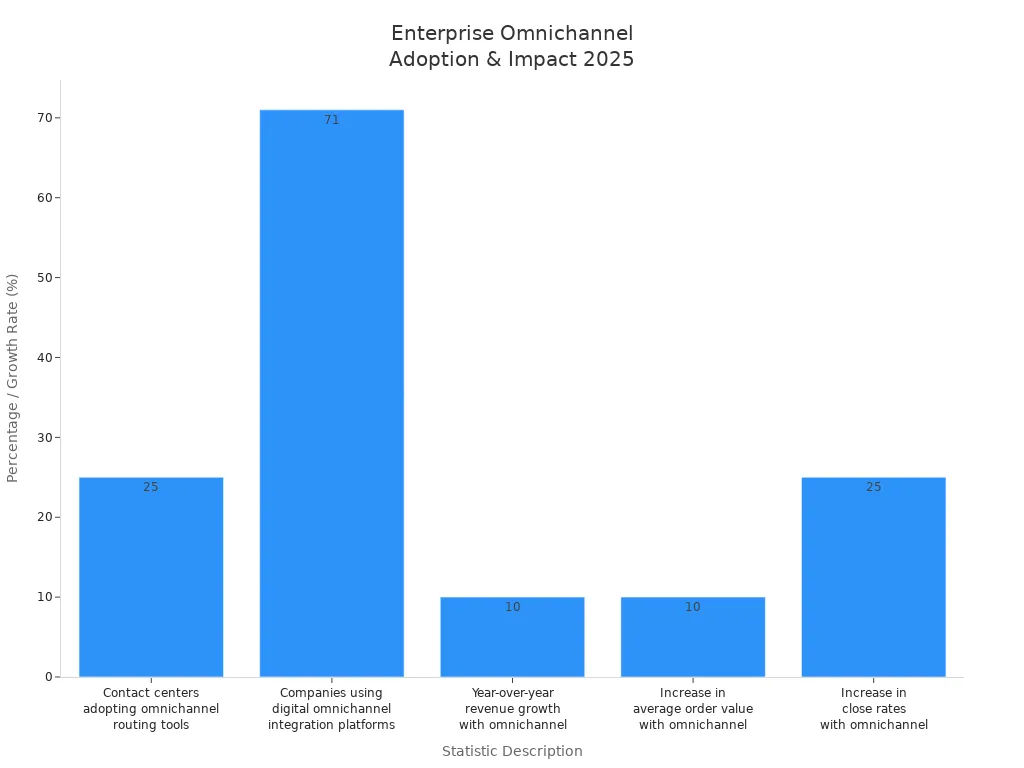
Omnichannel Contact Centre Solutions List

Quick Comparison
Selecting the right omnichannel contact centre solution can transform customer engagement and drive business growth. The table below compares the top contact center vendors, highlighting their key features, pricing models, and best use cases for enterprises seeking robust omnichannel customer service software.
| Vendor | Key Features & Differentiators | Pricing Model | Best Use Case |
|---|---|---|---|
| Sobot | AI-driven omnichannel support, unified workspace, global call center solutions, WhatsApp API | Tiered subscription | Enterprises needing all-in-one customer service platform with global reach |
| Five9 | AI agents, real-time analytics, workforce management, cloud-based contact center software | Pay-as-you-grow | Regulated industries and large-scale operations |
| Talkdesk | Sector-specific clouds, AI Launchpad, CRM integrations, omnichannel routing | Flexible subscription | Customizable CX environments |
| NICE CXone | Omnichannel support, advanced analytics, workforce optimization, cloud-native | Tiered plans | Enterprises seeking deep analytics and automation |
| Salesforce Service Cloud | Unified customer service software, AI-powered insights, CRM integration | Per-user subscription | Businesses using Salesforce ecosystem |
| Content Guru | High scalability, FedRAMP certification, cloud migration for complex centers | Enterprise contracts | Public sector and large enterprises |
| Cisco | AI-powered routing, deep ERP/CRM integration, strong security | Custom enterprise plans | Legacy modernization and secure cloud migration |
| UJET | Mobile-first CCaaS, real-time agent assistance, sentiment analysis | Usage-based pricing | Mobile-centric customer support |
💡 Most top contact center vendors offer cloud-based, scalable call center software solutions with omnichannel support, AI-driven enhancements, and flexible pricing to fit enterprise needs.
Selection Criteria
When evaluating omnichannel contact centre solutions, enterprises should focus on several critical factors:
- Consistent service delivery and high-quality data management across all channels.
- AI capabilities that enhance both customer experience and employee productivity.
- Integration with existing CRM and technology systems for seamless customer support.
- Advanced knowledge management and real-time analytics for actionable insights.
- Human-centered AI, including generative AI and tonal analysis, to personalize customer engagement.
- Hyper-personalization using customer data segmentation for accurate responses.
- Strong security and compliance with regulations like GDPR and CCPA.
- Scalable cloud infrastructure to support business growth and global operations.
- Unified customer service platform that brings together all communication channels.
- Reliable customer support and ongoing updates from the solution provider.
These criteria help enterprises choose contact center software that delivers efficient omnichannel customer service software, supports evolving customer needs, and drives superior customer engagement.
Sobot Omnichannel Solution
Overview
Sobot delivers a comprehensive omnichannel customer service software suite designed for enterprises seeking seamless customer support across every touchpoint. The platform stands out with its AI-First strategy, featuring five advanced AI pillars. These include omnichannel AI for unified communication, scenario-based AI for industry-specific needs, multi-faceted AI for tailored support, generative AI for accurate responses, and secure AI for global compliance. Sobot’s omnichannel customer service software integrates websites, mobile apps, social media, email, phone, SMS, and AI voicebots, creating a unified customer service platform that streamlines every customer interaction.
- Omnichannel AI connects all digital and voice channels.
- Scenario-based AI adapts to retail, e-commerce, and other industries.
- Multi-faceted AI supports customers, agents, and administrators.
- Generative AI delivers professional, industry-specific answers.
- Secure AI ensures compliance and data protection worldwide.
Key Features
Sobot’s omnichannel customer service software empowers enterprises with robust automation and integration. The AI Copilot automates routine tasks, reducing agent workload by 60%. The platform resolves issues in under one minute by combining AI and human agents. Automated workflows span all channels, boosting efficiency and enabling 24/7 customer support. Sobot’s call center software solutions integrate easily with existing systems, offering quick deployment and scalability.
| Improvement Aspect | Description | Impact/Metric |
|---|---|---|
| Agent Workload Reduction | AI Copilot automates routine tasks and supports agents, reducing their workload significantly | 60% reduction in agent workload |
| Resolution Time | Combination of AI and human agents enables faster issue resolution | Under 1 minute resolution time |
| Workflow Automation | Automated workflows across multiple channels streamline operations | Multi-channel automation |
| Platform Flexibility & Security | Easily integrates with existing tech stacks; built for large scale and security | Quick deployment, scalable, secure |
| Self-Service & Omnichannel | AI-driven self-service options allow 24/7 query resolution, reducing call volumes | 24/7 availability, reduced operational costs |
| Conversion Rate Improvement | AI engagement throughout customer journey boosts sales conversion | 15% increase in conversion rate |
| Customer Experience (NPS) | Personalized experiences powered by AI improve customer satisfaction | 35% improvement in NPS |
| Internal Collaboration | AI tools enhance collaboration among teams and automate routine tasks | Frees agents for complex issues |
| Return on Investment (ROI) | Overall efficiency gains maximize financial returns | 234% ROI |
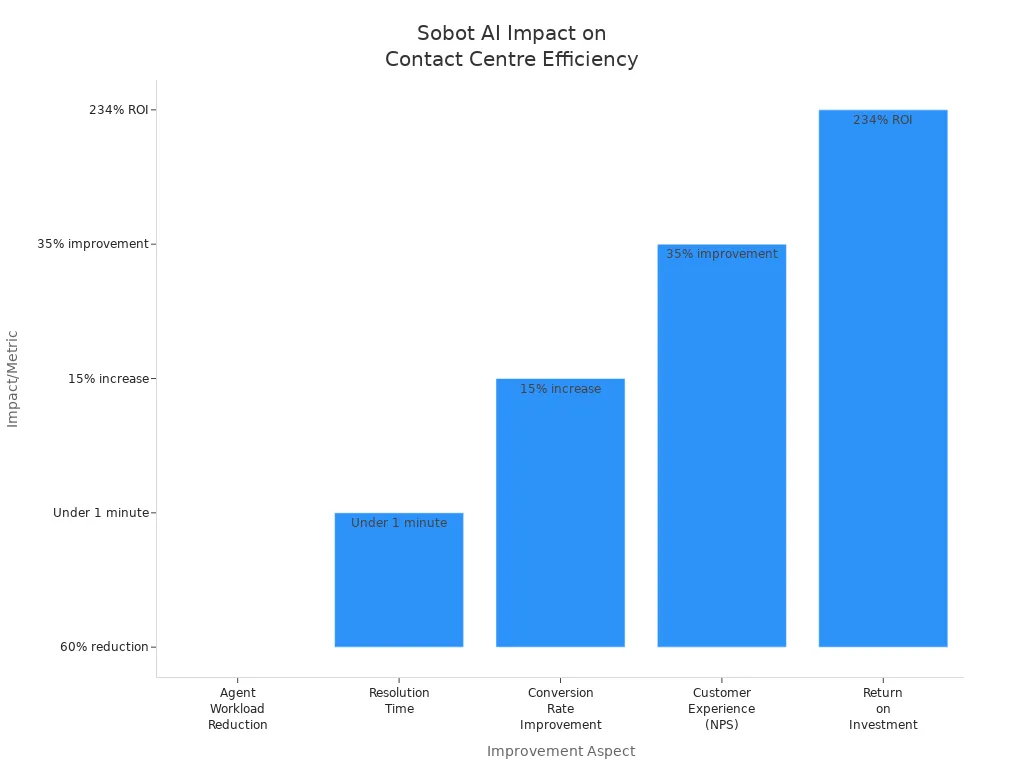
Benefits for Enterprises
Enterprises using Sobot’s omnichannel customer service software report measurable gains. Sales increase by 25%, customer complaints drop by 30%, and customer satisfaction rises by 25%. The platform also boosts customer retention by 15%. These improvements show how Sobot’s contact center software and call center software solutions drive business growth and customer loyalty.
| Measurable Benefit | Reported Improvement |
|---|---|
| Increase in Sales | 25% |
| Reduction in Customer Complaints | 30% |
| Increase in Customer Satisfaction | 25% |
| Increase in Customer Retention | 15% |
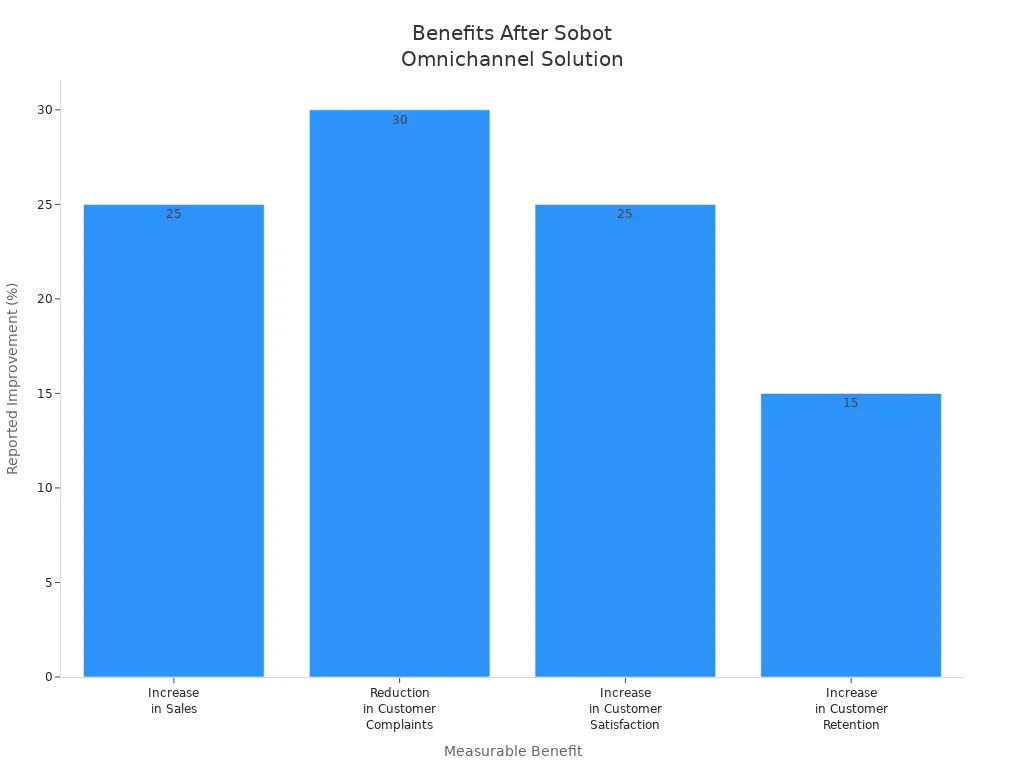
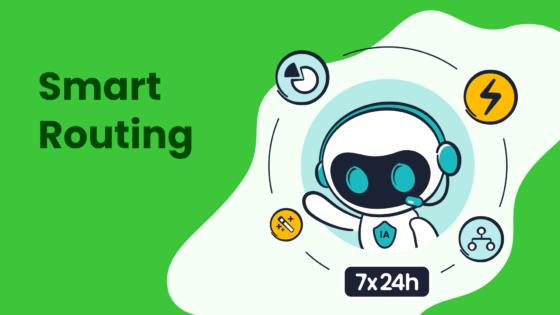
Voice/Call Center Capabilities
Sobot’s call center software solutions use advanced technologies like ASR, NLP, LLM, and TTS to deliver intelligent, human-like voice interactions. Voice AI agents handle over 50% of customer support calls, supporting both inbound and outbound communication. Batch outbound marketing increases sales by more than 30%. Sobot’s omnichannel customer service software covers all digital and voice channels, ensuring a seamless customer experience. The company maintains regional data centers in the US, Europe, and Singapore, providing reliable global performance. Sobot aligns with international security standards and holds multiple certifications, making it a trusted contact center software provider worldwide.
- Voicebot technology enables smart, natural conversations.
- Regional data centers ensure fast, secure service globally.
- Security certifications meet strict industry requirements.
Customer Success Story: Opay
Opay, a leading financial service platform, transformed its customer support with Sobot’s omnichannel customer service software. After deploying Sobot’s AI chatbot and unified customer service platform, Opay increased customer satisfaction from 60% to 90%. Operational costs dropped by 20%. Sobot’s contact center software enabled Opay to manage customer inquiries across social media, email, and voice channels, while the WhatsApp integration improved customer engagement. This success highlights the real-world impact of Sobot’s call center solutions for enterprises seeking efficient, scalable customer service software.
Genesys Cloud CX
Overview
Genesys Cloud CX stands as a leading cloud-based contact center platform for enterprises that demand flexibility and scale. The platform uses a cloud-native microservices architecture, which allows organizations to adapt quickly to changing customer needs. Genesys Cloud CX operates across multiple AWS regions, ensuring global reach and high availability. Enterprises benefit from a single core architecture that simplifies management and integration. The platform supports AWS Direct Connect, which enhances network performance and security by providing dedicated connectivity between on-premises infrastructure and the cloud. Genesys Cloud CX delivers continuous updates, so organizations always access the latest features and improvements. Many global brands trust Genesys Cloud CX to power their customer experience operations.
Features
Genesys Cloud CX offers a robust set of features designed for enterprise-scale deployments:
- Omnichannel routing for voice, chat, email, and social media.
- Real-time analytics and reporting dashboards.
- AI-powered bots and workforce engagement tools.
- Integration with CRM systems and third-party applications.
- Secure, scalable cloud infrastructure with 24/7 support.
- Automated workflows and self-service options for customers.
- Continuous delivery model for rapid feature deployment.
These features help enterprises deliver consistent and personalized cx across every channel. The platform’s flexibility supports both remote and in-office teams, making it suitable for modern hybrid work environments.
Pros and Cons
Tip: Enterprises should weigh the strengths and limitations of Genesys Cloud CX before making a decision.
Pros:
- High scalability and flexibility due to microservices architecture.
- Global availability with multi-region AWS deployment.
- Strong security and network performance with AWS Direct Connect.
- Frequent updates through a continuous delivery model.
- Comprehensive omnichannel cx capabilities.
Cons:
- Complex initial setup for organizations without cloud experience.
- Advanced features may require additional training for staff.
- Pricing can increase with advanced modules and higher usage.
Best Use Cases
Genesys Cloud CX fits enterprises that require a scalable, reliable, and secure platform for managing customer interactions. Large organizations with global operations benefit from its multi-region deployment and robust security. Companies that need to unify cx across voice, chat, and digital channels find value in its omnichannel capabilities. Genesys Cloud CX also suits businesses seeking to leverage AI for workforce engagement and customer self-service. For example, a multinational retailer can use Genesys Cloud CX to manage seasonal spikes in customer inquiries, while a financial institution can ensure secure and compliant cx worldwide. Enterprises looking for seamless integration with existing systems and rapid feature updates often choose Genesys Cloud CX to future-proof their customer experience strategy.
NICE CXone
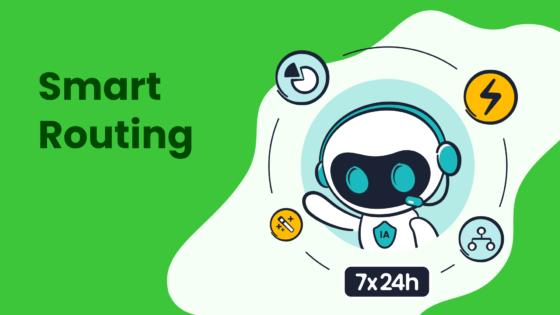
Overview
NICE CXone stands as a leading cloud-native platform for enterprises seeking advanced cx solutions. The platform supports flexible and scalable deployment, making it suitable for organizations of all sizes. With over twenty integrated omnichannel communication channels, NICE CXone enables seamless transitions for customers across voice, chat, email, and social media. The consolidated agent desktop, known as MAX, organizes all interactions, allowing agents to deliver consistent cx. The Enlighten AI suite powers the platform, providing smart virtual agents and proactive agent assistance. NICE CXone has seen rapid adoption, with a 400% increase in use of its CXone Mpower platform in one year. This growth highlights its ability to automate and manage customer journeys efficiently.
Features
NICE CXone offers a robust set of features that set it apart in the cx market:
- Cloud-native architecture for flexible deployment and scalability.
- Over twenty omnichannel communication channels for unified cx.
- Smart omnichannel routing that preserves context and connects customers to the same agent.
- MAX agent desktop for organizing all customer interactions.
- Enlighten AI suite, including Autopilot for self-service and Copilot for agent guidance.
- Advanced analytics and customizable reporting tools.
- Workforce engagement management to optimize agent performance.
These features help enterprises deliver seamless, personalized, and efficient cx at every touchpoint.
Pros and Cons
Note: Enterprises often choose NICE CXone for its extensive features and analytics, but some users report a learning curve.
Pros:
- Extensive features improve team productivity and cx.
- Advanced analytics enable data-driven decisions.
- Dependable customer support ensures quick issue resolution.
Cons:
- Steep learning curve compared to other cx solutions.
- Onboarding process can be time-intensive.
- User interface may appear complex to new users.
Best Use Cases
NICE CXone benefits enterprises with contact centers handling both voice and digital channels. Companies with sales teams and telemarketing operations see improved efficiency and cx. The platform supports proactive customer support and drives engagement using AI-driven tools. Thousands of businesses trust NICE CXone to create exceptional cx. Pricing plans cater to different needs, from digital-first businesses to large enterprises requiring advanced analytics and workforce engagement.
| Pricing Plan | Target Enterprise Type | Key Features and Benefits |
|---|---|---|
| Digital Agent | Digital-first businesses | Supports 30+ digital channels (email, chat, social media) |
| Voice Agent | Businesses focusing on voice interactions | Voice IVR, call recording, concurrent interaction handling |
| Omnichannel Agent | Businesses needing blended voice and digital | Blended routing, analytics dashboards |
| Essential Suite | Medium-sized contact centers | Quality management, performance monitoring, omnichannel support |
| Core Suite | Medium to large enterprises | AI-driven forecasting, scheduling, quality management workflows |
| Complete Suite | Large enterprises | Advanced omnichannel analytics, sentiment analysis, workforce engagement tools |
NICE CXone helps organizations transform cx into a revenue-generating function and optimize operations through automation. For enterprises seeking a unified approach, Sobot also provides all-in-one omnichannel cx solutions with AI-driven automation and global reach.
Five9 Omnichannel Support
Overview
Five9 delivers a robust omnichannel support platform designed for enterprises that need to manage customer interactions across many channels. The system uses AI-powered automation to improve operational efficiency and agent productivity. Five9 connects voice, email, chat, social media, SMS, and video, allowing companies to deliver a seamless customer experience. Large organizations often choose Five9 for its ability to scale and integrate with existing CRM and Unified Communications systems. The platform supports both inbound and outbound contact center operations, making it a flexible choice for businesses with complex needs.
Features
Five9 offers a wide range of features that help enterprises deliver effective omnichannel support:
- AI-powered automation that streamlines workflows and reduces manual tasks.
- Omnichannel digital engagement across voice, email, chat, social media, SMS, and video.
- Advanced workforce engagement and quality management tools to optimize agent performance.
- Real-time AI agent assist and generative AI capabilities for live support.
- Seamless integrations with CRM and UC systems for unified data access.
- Comprehensive reporting and analytics for data-driven decision making.
- Workflow automation that connects Five9 with other business systems.
These features enable organizations to personalize customer experiences and improve efficiency at scale.
Pros and Cons
Note: Five9 provides many strengths for large enterprises, but some challenges may arise during implementation.
Strengths:
- Comprehensive inbound, outbound, and blended call center functionality.
- Full omnichannel support for continuous customer engagement.
- Global voice and VoIP capabilities with regional Points of Presence.
- Workflow automation and open API for streamlined operations.
- Gamification features to boost agent motivation and reduce churn.
- 24/7 customer service with priority-based support.
Cons:
- Complex pricing structure, especially for omnichannel support plans.
- Implementation can take time due to extensive features and integrations.
- Limited analytics in basic plans may not meet all enterprise needs.
- Steep learning curve for advanced features, requiring thorough training.
- May be overwhelming and costly for smaller organizations.
Best Use Cases
Five9 omnichannel support serves a wide range of industries and business models. The platform fits healthcare, financial services, retail, higher education, government, sales, telemarketing, customer service, outsourcing, and collections. Companies of all sizes, from small businesses to large enterprises, use Five9 to power customer service centers, sales teams, tech support, and remote agent environments.
| Category | Examples/Details |
|---|---|
| Industries | Healthcare, Financial Services, Retail, Higher Education, Government, Sales & Telemarketing, Customer Services, Outsourcing, Collections |
| Company Size | Small Business, Mid-Market, Enterprise |
| Business Use Cases | Customer Service Centers, Sales Teams, Tech Support, Remote Agent Environments |
| Communication Channels Supported | Voice, Chat, Email, SMS, Social Media |
Many organizations choose Five9 for its strong omnichannel support and ability to handle high call volumes. For enterprises seeking a unified approach, Sobot also provides all-in-one omnichannel support with AI-driven automation and global reach, helping businesses achieve similar goals with a focus on innovation and efficiency.
Talkdesk Omnichannel
Overview
Talkdesk Omnichannel stands out as a modern contact center software solution for enterprises that want to deliver seamless customer experiences. The platform enables quick, contextualized responses through customers’ preferred channels, such as voice, chat, SMS, email, and social media. Agents use a channel-agnostic interface, which allows them to view all previous interactions and respond without switching systems. This unified approach helps enterprises close cases faster, reduce the average cost per case, and improve upsell opportunities. Talkdesk Omnichannel integrates with a wide range of enterprise tools, supporting scalability and compliance for growing organizations. The platform’s drag-and-drop IVR builder, Talkdesk Studio, simplifies complex call flow design, making it easier for teams to manage customer journeys.
Features
Talkdesk Omnichannel offers a robust set of features that appeal to enterprise customers:
- Enables agents to respond quickly and contextually across all major channels.
- Provides a unified workspace, displaying all customer interactions in one place.
- Integrates with popular enterprise platforms for seamless workflows.
- Supports advanced call flow design with an intuitive drag-and-drop IVR builder.
- Delivers AI-driven analytics and reporting for actionable insights.
- Scales to meet the needs of large organizations, ensuring efficiency and compliance.
These features help enterprises deliver consistent omnichannel customer service software experiences and improve operational efficiency.
Pros and Cons
| Aspect | Details |
|---|---|
| Pros | Intuitive design reduces learning curve. Advanced analytics provide deep insights. Reliable customer support minimizes downtime. |
| Cons | Higher cost may be prohibitive for smaller businesses. Feature overload can overwhelm some users. Limited customization compared to competitors. |
| Expert Opinion | Excels in analytics and support, suitable for medium to large businesses prioritizing data insights and support response. May not be ideal for those needing extensive customization or with tight budgets. |
💡 Talkdesk Omnichannel’s analytics and support capabilities make it a strong choice for enterprises focused on data-driven decision-making.
Best Use Cases
Enterprises use Talkdesk Omnichannel to unify customer service across multiple communication channels. The platform supports proactive engagement, such as sending updates, reminders, and self-service options. Intelligent routing matches customer queries to the best available agents, improving resolution speed and satisfaction. Real-time analytics and reporting help managers monitor agent performance and customer satisfaction. Workforce management tools support remote teams and ensure compliance. Talkdesk Omnichannel also helps organizations overcome integration challenges by unifying legacy and modern systems. The platform’s strong focus on data privacy and security ensures compliance with regulations like GDPR and CCPA.
For enterprises seeking integrated, efficient, and customer-centric communication, Talkdesk Omnichannel delivers a comprehensive contact center software solution. Companies looking for similar omnichannel customer service software with global reach and advanced AI may also consider Sobot, which offers unified call center software solutions tailored for diverse industries.
Salesforce Service Cloud
Overview
Salesforce Service Cloud stands as a trusted omnichannel customer service software platform for enterprises worldwide. With over 20 years in the market, Salesforce has built a reputation for reliability and innovation. Service Cloud helps organizations streamline customer support by centralizing all interactions in one place. The platform supports global teams and reduces IT resource needs compared to on-premises systems. Many large enterprises choose Service Cloud for its scalability, robust integration options, and strong ecosystem of partners. Companies in retail, financial services, healthcare, and manufacturing often rely on Salesforce Service Cloud to manage complex customer interactions and deliver consistent experiences.
Features
Service Cloud offers a wide range of features designed to improve customer service and agent productivity:
- Omni-channel support connects email, phone, chat, and social media in a single workspace.
- The Service Console gives agents a 360-degree view of each customer, helping them resolve cases faster.
- AI-powered tools like Einstein AI automate routine tasks and suggest next steps.
- Knowledge Base provides self-service resources for both customers and agents, reducing ticket volume.
- Service Cloud Voice integrates telephony with CRM, allowing seamless call management.
- Swarming enables real-time collaboration among experts to solve complex issues.
- Visual Remote Assistant uses video streaming and AR to help resolve problems quickly.
- Field Service supports mobile workforce management and smart scheduling.
These features help enterprises deliver fast, effective, and personalized support across every channel.
Pros and Cons
Salesforce Service Cloud brings many advantages to large enterprises, but it also presents some challenges. The table below summarizes the most significant pros and cons:
| Pros | Cons |
|---|---|
| Streamlines customer service processes for faster, more effective responses | Full reliance on stable internet connectivity |
| Extensive customization with low-code and advanced programming options | Advanced customization can be complex and costly, requiring specialized developers |
| Highly scalable with robust integration options (ERP, ITSM, document management) | High costs may not suit smaller companies; additional purchases needed for data storage beyond 10 GB |
| Trusted CRM platform with 20+ years of market presence and reliability | Limited control over Salesforce upgrade schedules and planned downtimes |
| Global accessibility and reduced IT resource needs compared to on-premises systems | Risk of over-customization making the system clunky and harder to use |
| Vast ecosystem of consulting and technical partners | Standardized functionality may require extra tuning and customization, increasing expenses |
💡 Enterprises should weigh the benefits of scalability and integration against the potential complexity and cost when choosing contact center software.
Best Use Cases
Salesforce Service Cloud addresses a variety of enterprise scenarios, making it a flexible choice for omnichannel customer service software:
- Case management for tracking and resolving customer inquiries efficiently.
- Managing business hours and support holidays to set clear customer expectations.
- Centralizing interactions across channels for a unified support experience.
- Providing a knowledge base for self-service and agent assistance.
- Customizable agent workspaces for handling multiple cases at once.
- Swarming for expert collaboration on complex issues.
- Integrating telephony with CRM for seamless call center software solutions.
- Automating case creation from web forms and emails.
- Expanding messaging to channels like WhatsApp and Facebook Messenger.
- Supporting field service operations with mobile access and smart scheduling.
- Delivering visual remote assistance with video and AR tools.
Many enterprises combine Salesforce Service Cloud with other platforms, such as Sobot, to create a unified customer service platform that covers every touchpoint. Sobot’s omnichannel customer service software and call center software solutions offer seamless integration, AI-driven automation, and global reach, making them a strong complement to Salesforce for organizations seeking innovation and efficiency.
Zendesk Omnichannel Customer Service Software
Overview
Zendesk offers a robust omnichannel customer service software platform designed for large enterprises. The system brings together chat, email, phone, social media, and self-service portals, allowing agents to retain context as they move between channels. Zendesk’s AI-enhanced chatbots provide instant answers and escalate complex issues to human agents. Smart voice integration uses AI-driven call routing and real-time agent assistance to optimize every customer support interaction. Enterprises benefit from centralized case management and actionable AI-powered insights, making Zendesk a scalable and intelligent choice for customer service software.
Features
Zendesk’s omnichannel customer service software stands out with its multichannel ticketing, live chat, and messaging capabilities. The platform converts requests from phone, chat, email, and social media into centralized tickets for unified management. Agents can switch seamlessly between channels, including Facebook Messenger and WhatsApp, using Zendesk Messaging. AI-powered chatbots automate responses and escalate queries when needed. Smart voice integration reduces wait times with AI-driven call routing. Enterprises can customize dashboards and access advanced analytics through Zendesk Explore. Over 1,000 integrations, including Oracle, Salesforce, and Microsoft Teams, support complex enterprise needs.
| Feature Category | Description |
|---|---|
| Multichannel Ticketing | Centralizes requests from all channels for unified management. |
| Live Chat & Messaging | Enables seamless agent transitions across chat and messaging apps. |
| AI-Enhanced Chatbots | Automates responses and escalates complex queries. |
| Smart Voice Integration | Optimizes call handling with AI-driven routing and real-time assistance. |
| Customization & Reporting | Offers advanced analytics and customizable dashboards. |
| Enterprise Integrations | Supports 1,000+ integrations for complex enterprise ecosystems. |
Pros and Cons
Zendesk’s omnichannel customer service software delivers strong omnichannel support, customizable dashboards, and AI-powered automation. Enterprises appreciate its robust data security and compliance with global privacy regulations. The platform scales well and offers extensive customization, though advanced options may require developer assistance.
| Aspect | Pros | Cons |
|---|---|---|
| Omnichannel Support | Consolidates all customer support channels for efficiency | Steep learning curve due to feature-rich interface |
| Customizable Dashboards | Advanced analytics and reporting tools | Pricing can be high, with premium features at higher tiers |
| AI-Powered Automation | Automates workflows and improves response times | Customization complexity may require technical expertise |
| Security & Compliance | Strong data security and GDPR compliance | Some users report challenges with support and navigation |
Note: Zendesk’s omnichannel customer service software suits enterprises with large teams and complex needs, but setup and training require time and resources.
Best Use Cases
Large organizations with 500+ employees and complex product offerings often choose Zendesk’s omnichannel customer service software. The platform supports companies needing centralized ticket management, advanced analytics, and integration with major enterprise software. Enterprises in retail, finance, and technology use Zendesk to unify customer support across channels and deliver consistent experiences. For businesses seeking a unified approach with AI-driven automation and global reach, Sobot also provides comprehensive omnichannel customer service software tailored for diverse industries.
Choosing a Solution
Selecting the right omnichannel contact center solution shapes the future of customer experience. Enterprises must evaluate several core factors to ensure the solution delivers better customer experience, drives satisfaction, and supports long-term growth.
Scalability
A scalable solution grows with the business. Enterprises should look for omnichannel solutions that offer modular architecture. This allows teams to add new channels and features without disrupting operations. Multi-tenant architecture supports different departments or brands under one platform. Unified maintenance and centralized resource management simplify upgrades. Sobot, for example, provides a cloud-based solution that supports global expansion and high-volume customer interactions. Flexible workflows and intelligent automation help organizations adapt quickly as customer needs change.
- Choose customizable solutions that scale with business growth.
- Ensure modular design for easy addition of channels.
- Look for unified management and maintenance.
- Evaluate flexible pricing and support for onboarding.
Integrations
Seamless integration with existing business tools is essential. The right solution should connect with CRM, analytics, and workforce management systems. Open APIs prevent data silos and enable unified customer interaction management. Sobot’s omnichannel solution integrates with platforms like Salesforce and Shopify, ensuring smooth data flow and consistent customer experience.
Security
Security remains a top priority for any enterprise. The best solutions provide robust data encryption, both in transit and at rest. Compliance with regulations such as GDPR and PCI DSS protects sensitive customer information. Features like activity logging, access controls, and regular vulnerability assessments reduce risk. Sobot’s cloud solution meets international security standards, including ISO/IEC 27001 certification, and offers 24/7 monitoring.
- Data encryption for all customer data
- Compliance with industry regulations
- Real-time monitoring and regular security updates
- Strong access controls and secure integrations
Analytics
Advanced analytics drive actionable insights. Enterprises should select solutions that offer real-time dashboards, performance monitoring, and customer satisfaction tracking. Analytics help teams identify trends, improve processes, and boost customer satisfaction. Sobot’s solution provides unified analytics across all channels, supporting data-driven decisions and continuous improvement.
Support
Reliable support ensures smooth operation. Enterprises need solutions with responsive customer service, onboarding assistance, and ongoing training. Access to technical resources and regular updates keeps the platform running efficiently. Sobot offers dedicated support, helping enterprises maximize the value of their investment and maintain high customer satisfaction.
Tip: Enterprises that prioritize scalability, integration, security, analytics, and support build a strong foundation for their customer experience strategy.
2025 Omnichannel Trends
The omnichannel landscape continues to evolve rapidly in 2025. Enterprises see new technologies and strategies that shape how they deliver customer experience. Four major trends stand out: AI and automation, personalization, cloud migration, and analytics. These trends help businesses improve customer satisfaction, streamline operations, and create a seamless omnichannel journey.
AI and Automation
AI and automation now drive the core of omnichannel customer service. Companies use AI-powered cx tools to handle routine tasks, answer questions, and route requests. This technology reduces agent workload and speeds up response times. For example, Sobot’s omnichannel platform uses AI chatbots and voicebots to resolve over 50% of customer inquiries without human intervention. According to Gartner, 80% of customer service teams will use AI-driven messaging by 2025. Automation ensures customers get fast, accurate answers, which boosts satisfaction and loyalty.
Personalization
Personalized customer support has become a top priority. Omnichannel solutions now use customer data to tailor every interaction. Businesses track preferences, purchase history, and previous conversations to deliver relevant recommendations. Sobot’s unified workspace gives agents a complete view of each customer, making every experience feel unique. Personalized service increases customer satisfaction and helps companies build long-term relationships. Studies show that 76% of consumers expect personalized experiences across all channels (McKinsey).
Cloud Migration
Cloud technology powers the modern omnichannel contact center. More enterprises move to cloud-based software for flexibility, scalability, and cost savings. A cloud contact center allows teams to support customers from anywhere and scale up during busy periods. Sobot’s cloud solution offers 99.99% uptime and global coverage, ensuring reliable service. Cloud platforms also make it easier to add new channels and features. In 2025, over 90% of organizations will use cloud for their omnichannel operations (IDC). Cloud migration supports business growth and improves customer experience.
Analytics
Analytics play a key role in omnichannel strategy. Companies use real-time data to monitor performance, track customer satisfaction, and identify trends. Advanced analytics help teams spot issues early and make data-driven decisions. Sobot’s omnichannel platform provides unified analytics across all channels, helping businesses improve service quality and boost satisfaction. With better insights, companies can optimize workflows and deliver a consistent customer experience. Analytics also support continuous improvement, making it easier to meet changing customer needs.
Enterprises that embrace these trends will lead in customer satisfaction and loyalty. Omnichannel solutions like Sobot help businesses stay ahead by combining AI, cloud, and analytics for a seamless customer journey.
Selecting the right omnichannel solution shapes every customer interaction. Top contact center vendors deliver platforms that unify channels, boost efficiency, and improve customer satisfaction. Sobot stands out among top contact center vendors for its AI-driven omnichannel approach and proven results, such as a 25% increase in customer satisfaction. Enterprises should review the comparison of top contact center vendors, assess omnichannel features, and focus on customer needs. Requesting a demo from top contact center vendors like Sobot helps decision-makers experience real omnichannel value and customer impact.
Next step: Contact Sobot or other top contact center vendors for a personalized omnichannel demo and see how customer journeys can transform.
FAQ
What is omnichannel customer service software?
Omnichannel customer service software connects all communication channels, such as chat, email, phone, and social media, into one platform. This integration helps agents deliver consistent support. Sobot’s solution unifies these channels, improving customer satisfaction and operational efficiency for enterprises.
How does Sobot ensure data security in its contact center software?
Sobot’s contact center software uses encrypted data transfer and complies with global standards like ISO/IEC 27001. The system maintains 99.99% uptime and offers real-time monitoring. Enterprises trust Sobot to protect sensitive customer information and meet strict regulatory requirements.
Why do enterprises choose Sobot’s call center software solutions?
Enterprises select Sobot’s call center software solutions for global reach, AI-driven automation, and seamless integration with CRM systems. Sobot supports over 10,000 brands and handles millions of daily interactions, helping businesses reduce costs and improve customer satisfaction.
Can Sobot’s omnichannel customer service software integrate with existing business tools?
Yes. Sobot’s omnichannel customer service software integrates with platforms like Salesforce and Shopify. This capability allows enterprises to unify customer data, streamline workflows, and deliver a seamless customer experience across all channels.
What measurable benefits do companies see after using Sobot’s contact center software?
Companies using Sobot’s contact center software report a 25% increase in sales, a 30% drop in customer complaints, and a 25% rise in customer satisfaction. These results show the value of adopting advanced omnichannel customer service software for enterprise growth.
For more details, visit Sobot’s official website.
See Also
How To Successfully Deploy Omnichannel Contact Center Solutions
Comprehensive Guide To Choosing Omnichannel Call Center Software
Best Contact Center Solutions Evaluated For The Year 2024
Leading Ten AI Tools Transforming Enterprise Contact Centers
